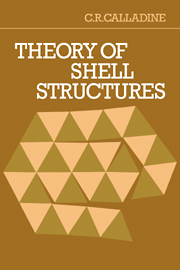Book contents
- Frontmatter
- Contents
- Preface
- List of symbols
- 1 Introduction
- 2 Generalised Hooke's law for an element of a shell
- 3 Cylindrical shells under symmetric loading
- 4 Purely ‘equilibrium’ solutions for shells: the membrane hypothesis
- 5 The geometry of curved surfaces
- 6 Geometry of distortion of curved surfaces
- 7 Displacements of elastic shells stressed according to the membrane hypothesis
- 8 Stretching and bending in cylindrical and nearly-cylindrical shells
- 9 Problems in the behaviour of cylindrical and nearly-cylindrical shells subjected to non-symmetric loading
- 10 Cylindrical shell roofs
- 11 Bending stresses in symmetrically-loaded shells of revolution
- 12 Flexibility of axisymmetric bellows under axial loading
- 13 Curved tubes and pipe-bends
- 14 Buckling of shells: classical analysis
- 15 Buckling of shells: non-classical analysis
- 16 The Brazier effect in the buckling of bent tubes
- 17 Vibration of cylindrical shells
- 18 Shell structures and the theory of plasticity
- Appendices
- Answers to selected problems
- References
- Index
11 - Bending stresses in symmetrically-loaded shells of revolution
Published online by Cambridge University Press: 02 February 2010
- Frontmatter
- Contents
- Preface
- List of symbols
- 1 Introduction
- 2 Generalised Hooke's law for an element of a shell
- 3 Cylindrical shells under symmetric loading
- 4 Purely ‘equilibrium’ solutions for shells: the membrane hypothesis
- 5 The geometry of curved surfaces
- 6 Geometry of distortion of curved surfaces
- 7 Displacements of elastic shells stressed according to the membrane hypothesis
- 8 Stretching and bending in cylindrical and nearly-cylindrical shells
- 9 Problems in the behaviour of cylindrical and nearly-cylindrical shells subjected to non-symmetric loading
- 10 Cylindrical shell roofs
- 11 Bending stresses in symmetrically-loaded shells of revolution
- 12 Flexibility of axisymmetric bellows under axial loading
- 13 Curved tubes and pipe-bends
- 14 Buckling of shells: classical analysis
- 15 Buckling of shells: non-classical analysis
- 16 The Brazier effect in the buckling of bent tubes
- 17 Vibration of cylindrical shells
- 18 Shell structures and the theory of plasticity
- Appendices
- Answers to selected problems
- References
- Index
Summary
Introduction
The subject of this chapter is the behaviour of thin elastic shells of revolution which are subjected to loads applied symmetrically about the axis of revolution. In chapter 4 we studied the same problem, but there we worked under the simplifying conditions of the ‘membrane hypothesis’; and the analysis involved only the equations of statical equilibrium. In the present chapter we shall not exclude in this way the possible occurrence of normal shearstress and bending-stress resultants; and in consequence we shall need to consider not only the equations of equilibrium but also the conditions of geometric compatibility and the generalised Hooke's law. In the main we shall assume, for the sake of convenience, that the shell is stress-free in its initial, unloaded state. This is by no means always true in practice, and we shall discuss some important exceptions in section 11.6. However, it is always correct to regard our analysis as giving properly the change of stress resultants, displacements, etc. on account of a change of loading. Throughout the chapter we shall adopt the ‘classical’ assumption that displacements, strains and rotations are so small that the various equations may be set up in relation to the original, undeformed, configuration of the shell. Some remarks on the validity of this assumption are made in section 11.6.
On account of the symmetry of both the shell and its loading, the problem becomes one dimensional, in the sense that all of the relevant quantities are functions of a single variable which describes the position of a point on the meridian.
Information
- Type
- Chapter
- Information
- Theory of Shell Structures , pp. 361 - 412Publisher: Cambridge University PressPrint publication year: 1983
